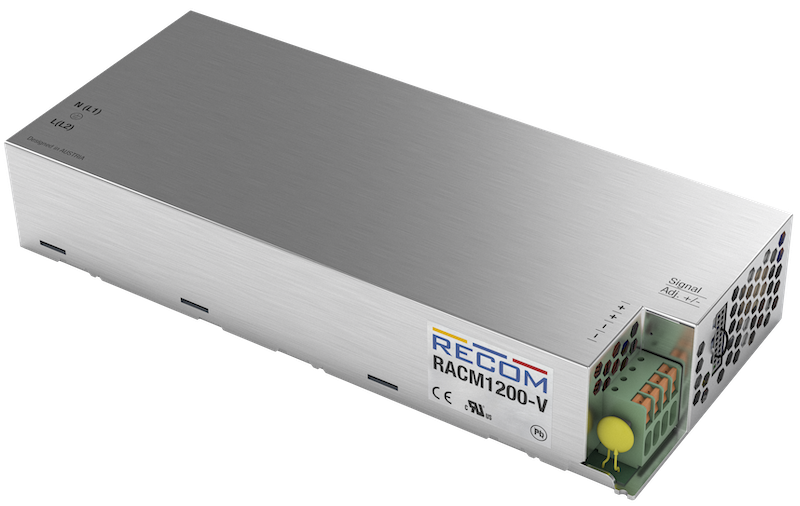Arrow partners with Recom to identify ‘optimal power supply solution’ for robots
Automating industrial processes using robots has typically been the preserve of large companies that have the resources to make the investment and see the project through to completion.
Robco – the Robot Company – is now making the benefits of advanced automation more easily accessible for small-to-medium enterprises (SMEs) with its new approach to building industrial robots.
Constantin Dresel, Robco’s head of development, says: “We want to redefine automation in SMEs with our powerful modular construction kit. This concept allows us to very quickly deliver a customised solution that can be ready to use immediately without any complex programming or reliance on specialised skills.”
Robco’s plug and play robot modules can be quickly and easily assembled on-site and can be flexibly converted in situ at any time to adapt to changing requirements, without needing trained specialists. This approach gives manufacturing companies a cost-effective option for the use of advanced automation.
Dresel says: “Some solutions pay for themselves after only 30 days.”

Power Struggle
To secure the necessary product approvals for placing these robots on the market in Europe, Robco had to put the modules through compliance testing.
It was at this stage that the test house, TÜV, noticed the main power supply in the central control system was not certified to the appropriate EN 60204-1 safety standard (Safety of machinery – Electrical equipment of machines – Part 1). A quick replacement was needed.
Searching for a suitably compliant PELV (Protective Extra Low Voltage) power supply unit, Frank Thelen, co-owner of Robco through his venture capital fund “Freigeist Capital”, posted an enquiry on LinkedIn.
Frank is a well-known businessman and investor, and former panel member on the popular German entrepreneurial TV show, The Lion’s Den. It was no surprise that his post was seen by many people, including Lars Foerster, market development engineer for power at Arrow. “I knew we could come up with a solution to Robco’s problem,” says Foerster.
Foerster continues, “We have 22 partner manufacturers in the power supply group at Arrow in Europe and our responsibility is to maintain in-depth knowledge of the companies, their technical teams, and all of their products. This allows us to quickly propose the optimal solution to meet each customer’s needs.”
Foerster telephoned Constantin and a few days later they met with Harald Hack, business development manager at Arrow’s power supply partner Recom Electronic.
Together with two application engineers specialised in AC/DC power supplies, one from Arrow and one from Recom, the group managed to identify all the requirements of the application, from safety certifications and electrical performance to basic details for installing the PSU.
Broadly, these requirements were for an 800-1000 Watt PSU with 48V output, compact dimensions of 9″ x 3.8″ in an enclosed housing, with built-in protection against contact with live parts, insulation voltage 4kVAC (reinforced insulation from input to output), and overvoltage category III (OVCIII) according to IEC 62477-1.
An important requirement of the safety standards for machinery is that the DC output voltage of the power supply must never exceed 60 V, so that users cannot receive an electric shock if they come into contact with the unit.
Fanless operation was specified to prevent ingress of contaminants, ensure quiet operation, and eliminate the fan as a potential point of mechanical failure. Failure of the fan usually causes failure of the entire power supply unit.
Hack says: “This was a very interesting project enquiry for a fanless AC/DC power supply under 1000 W for a demanding industrial environment.
“The specification we developed during this meeting suggested that our new, baseplate-cooled RACM1200-V AC/DC power supply would be a great fit. These are extremely compact PSUs in their class and deliver high efficiency, at over 90 percent.
“They can supply up to 1200 W for short periods if required and are certified to medical, industrial, and ITE safety and EMC standards, including EN 60204-1 as specifically requested for this project. Protection against short-circuit, overload, and overvoltage are built in and the power supply also features hiccup mode to recover without intervention by the system.”
Optimal collaboration shrinks design-in time
Hack says: “We provided a prototype of the RACM1200-48SAV/ENC for testing, fitted with the appropriate interface cables and connectors, so that Robco’s engineers could start working with it immediately.”
Recom also provided direct technical support, including accurate measurements and advice about operating conditions like the maximum allowable ambient temperature in the housing around the power supply unit.
Recom provided reports documenting the relevant safety approvals for the RACM1200-48SAV/ENC, which helped Robco quickly obtain the necessary system-level approvals, working with TÜV.
Foerster says: “We achieved a very fast design-in time of just eight months.
“Usually it takes at least a year, often longer, to ensure a power supply like this is implemented correctly. Thanks to the speedy work by all those involved, the project has progressed quickly and the first units have just been delivered ready for production of Robco’s revolutionary robot modules to begin.”

